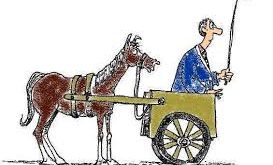Till Fadime Sahindal, född 2 april 1975 i Turkiet, mördad 21 januari 2002 i Sverige I Sverige har vi länge okritiskt omhuldat en ospecificerad och odefinierad mångkulturalism. Om vi med mångkulturalism menar att det med kulturell tillhörighet och identitet också kommer specifika moraliska, etiska och politiska rättigheter och skyldigheter, talar vi om normativ multikulturalism. Att acceptera normativ mångkulturalism, innebär att också tolerera oacceptabel intolerans, eftersom...
Read More »Maximum likelihood estimation (student stuff)
Maximum likelihood estimation (student stuff) .[embedded content]
Read More »Statistical philosophies and idealizations
Statistical philosophies and idealizations As has been long and widely emphasized in various terms … frequentism and Bayesianism are incomplete both as learning theories and as philosophies of statistics, in the pragmatic sense that each alone are insufficient for all sound applications. Notably, causal justifications are the foundation for classical frequentism, which demands that all model constraints be deduced from real mechanical constraints on the...
Read More »Cambridge economics has died out
Cambridge economics has died out A couple of weeks ago yours truly had a review of Diane Coyle’s Cogs and Monsters in WEA Commentaires. As I wrote, there’s a lot in the book to like, but unfortunately also some things very hard to swallow. James Galbraith seems to argue along the same lines in his Project Syndicate review: Coyle subscribes to the grand illusion that price adjustment is the economy’s prime mover. But as the Cambridge Keynesian economist...
Read More »Juloratoriet (personal)
Kjell-Åke Andersson turned Göran Tunström’s s epic masterpiece The Christmas Oratory into a stunningly beautiful and emotionally upsetting movie. Stefan Nilsson wrote the breathtaking music. And it still breaks my heart every time I watch it … [embedded content]
Read More »Bayesian superficiality
The bias toward the superficial and the response to extraneous influences on research are both examples of real harm done in contemporary social science by a roughly Bayesian paradigm of statistical inference as the epitome of empirical argument. For instance the dominant attitude toward the sources of black-white differential in United States unemployment rates (routinely the rates are in a two to one ratio) is “phenomenological.” The employment differences are traced to...
Read More »Scientific realism and inference to the best explanation
Scientific realism and inference to the best explanation In inference to the best explanation we start with a body of (purported) data/facts/evidence and search for explanations that can account for these data/facts/evidence. Having the best explanation means that you, given the context-dependent background assumptions, have a satisfactory explanation that can explain the fact/evidence better than any other competing explanation — and so it is reasonable to...
Read More »Why Bayesianism doesn’t resolve scientific disputes
Why Bayesianism doesn’t resolve scientific disputes The occurrence of unknown prior probabilities, that must be stipulated arbitrarily, does not worry the Bayesian anymore than God’s inscrutable designs worry the theologian. Thus Lindley (1976), one of the leaders of the Bayesian school, holds that this difficulty has been ‘grossly exaggerated’. And he adds: ‘I am often asked if the [Bayesian] method gives the right answer: or, more particularly, how do you...
Read More »Beyond Bayesian probabilism
Although Bayes’ theorem is mathematically unquestionable, that doesn’t qualify it as indisputably applicable to scientific questions. Science is not reducible to betting, and scientific inference is not a branch of probability theory. It always transcends mathematics. The unfulfilled dream of constructing an inductive logic of probabilism — the Bayesian Holy Grail — will always remain unfulfilled. Bayesian probability calculus is far from the automatic inference engine that...
Read More »Bayesianism — the new positivism
Bayesianism — the new positivism No matter how atheoretical their inclination, scientists are interested in relations between properties of phenomena, not in lists of readings from dials of instruments that detect those properties … Here as elsewhere, Bayesian philosophy of science obscures a difference between scientists’ problems of hypothesis choice and the problems of prediction that are the standard illustrations and applications of probability theory....
Read More » Lars P. Syll
Lars P. Syll








